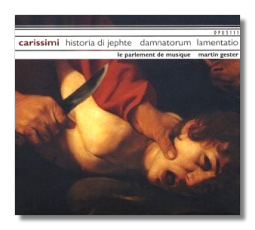
The Internet's Premier Classical Music Source
Related Links
- Latest Reviews
- More Reviews
-
By Composer
-
Collections
DVD & Blu-ray
Books
Concert Reviews
Articles/Interviews
Software
Audio
Search Amazon
Recommended Links
Site News
 CD Review
CD Review
Sacred Concert

- Giacomo Carissimi:
- Historia de Jephte
- Damnatorum lamentatio
- Felicitas beatorum
- Lelio Colista:
- Sinfonia in D minor for 2 Violins, Bass Viol & Continuo
- Sinfonia in B Flat Major for 2 Violins, Theorbo & Continuo
- Girolamo Frescobaldi:
- mors illa
- Deus noster
- Partite sopra passacagli (Toccata)
Le Parlement de musique/Martin Gester
Opus 111/Naïve OPS30296 DDD 63:33
This concept CD attempts to construct a virtual "sacred concert" as it might have been heard in Rome around 1650. It is highly unlikely that these works ever were presented together until now, but there's no reason – at least in theory – why they couldn't have been played in a Roman church during Lent. French writer André Maugars visited Rome in 1639 and left an account of what his countrymen called a "concert spirituel," although stylistically, it was unlike anything known in France at that time. In essence, what came to be known as the oratorio genre was apparently Italian in origin. The French were unfamiliar with the idea of a Biblical story told in recitative, and interspersed with arias and choruses, and this "stile recitatif" made a strong impression on Maugars, and subsequently on French composers.
Carissimi (1605-1674) was one of the most prominent Italian composers to write oratorios, and Historia de Jephte is a classic example of his work. Jepthe (a tenor) vows to sacrifice to the Lord the first thing that comes from his house to greet him if he is victorious over the tribe of Ammon. He is granted victory and he returns home, where he is greeted by his beloved daugher (a soprano). Jepthe bemoans this twist of fate, but the daughter submits, asking only that she and her companions be allowed to wander the mountains for two months to "bewail her virginity," as she is to be sacrificed before she can become a mother. The chorus – actually, other soloists – acts as a narrator and commentator. Carissimi's treatment of this story is beautifully restrained, and all the more poignant for not milking every opportunity for emotion.
Additionally, Carissimi is represented on this CD by Damnatorum lamentatio ("Lament of the Damned"), a "sacred history" in which three singers, with instrumental accompaniment, graphically paint the horrors of hell, literally regretting the day they were born. Another "sacred history," Felicitas beatorum ("Happiness of the Blessed") is the other side of the coin, as it were. Three sopranos, again with instrumental accompaniment, sing of the virtuous lives they led and how eternal glory will be their reward.
Two sinfonie by Lelio Colista (1629-1680) are fine examples of abstract, purely instrumental music appropriate for a sacred setting. Girolamo Frescobaldi's (1583-1643) toccata for harp falls into the same category. Two short sacred motets (one a solo and the other a duet) by this same composer fill out the program.
Martin Gester's scholarship is impressive, and the booklet contains a lot of information about the challenges associated with performing this repertoire, for which autograph scores are largely unavailable. Musicians such as Gester must rely on copies that other musicians made, and these copies are seldom faithful (although "authenticity" was not something to which musicians of that time devoted much thought). Perhaps it is no surprise that these performances of Italian music have a decidedly (but pleasantly) French flavor, particularly because French composers such as Brossard and Charpentier made copies of Carissimi's sacred works. These performances are refined and pure-toned, but not at all inexpressive. Those who know Jephte, for example, from earlier recordings in which an actual chorus was used will be surprised by Gester's smaller-scaled interpretation. If they give this CD a chance, I think those listeners will be won over by Gester and his Parlement de musique.
The sound is clear and warm, and the digipak presentation is attractive, leaving room for the large booklet and cover art by Caravaggio.
Copyright © 2003, Raymond Tuttle




















